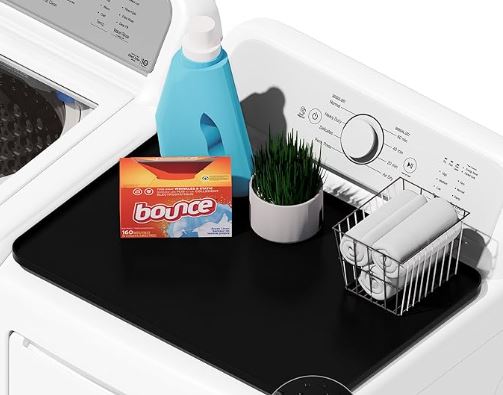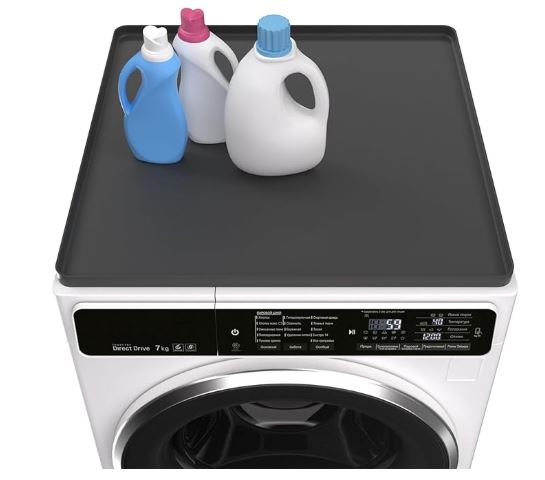That rhythmic hum of laundry day shouldn’t turn into a concert of grinding, squealing, or banging. If your LG washer sounds like it’s auditioning for a heavy metal band during the spin cycle, you’re not imagining things.
Whether you’ve got a brand-new model fresh out of the box or a reliable unit that’s suddenly gone rogue, unusual spinning noises signal something needs attention.
This guide walks you through every noise type, from high-pitched squeals to deep grinding sounds, across LG’s top load, front load, and direct drive models—with actionable fixes you can tackle today.

In short, why is your LG washing machine making noise when spinning?
Most LG washing machines make noise when spinning due to worn drum bearings, foreign objects trapped in the drum, unbalanced loads, loose shock absorbers, or failing drive motors. New machines may have shipping bolts still installed, while older units often develop bearing wear that creates grinding sounds requiring professional replacement.
Quick Noise Diagnosis Summary
| Noise Type | Most Likely Cause | Quick Action |
| Grinding/rumbling | Worn drum bearings | Check for play in drum movement |
| High-pitched squeal | Belt wear or motor issue | Inspect belt condition |
| Banging/thumping | Unbalanced load | Redistribute clothes evenly |
| Clicking/rattling | Foreign object in drum | Check drum and pump filter |
| Loud vibration | Shipping bolts installed | Remove all transit bolts |
Understanding Why LG Washers Develop Spinning Noises
LG washing machines use sophisticated drum suspension systems and direct drive technology that minimize noise during normal operation. When unusual sounds emerge, they’re your machine’s way of flagging mechanical stress or component failure.
The spin cycle pushes your washer to its performance limits. Drums rotate between 1,000-1,400 RPM depending on your model. At these speeds, even minor imbalances or worn components amplify into noticeable noise.
Front loaders typically run quieter than top loaders due to their horizontal drum orientation. However, they’re more susceptible to bearing failure because the drum’s weight creates constant pressure on bearing assemblies.
LG’s direct drive washers eliminate traditional belts by mounting the motor directly to the drum. This design reduces parts that can fail but concentrates stress on the motor and bearing system.
New LG Washing Machine Making Noise When Spinning
Brand-new appliances shouldn’t sound like they’re falling apart. If your recently purchased LG washer is already making racket, installation issues are the usual suspects.
Shipping Bolts Still Installed
Transit bolts secure the drum during transportation. They prevent damage but must be removed before first use.
These bolts lock the suspension system in place. When you run a spin cycle with bolts installed, the drum can’t move naturally, creating violent shaking and loud banging.
Check the rear panel of your washer. You’ll find three to four large bolts with plastic spacers. Remove them completely using a wrench and store them for future moves.
LG front loaders position shipping bolts on the back panel at drum height. Top loaders may have foam blocks or cardboard inserts instead of bolts.
Improper Leveling on Floor Surface
Unlevel washers rock during high-speed spinning. This creates repetitive thumping as the machine shifts weight.
Use a bubble level across your washer’s top surface. Adjust the front leveling feet by turning them clockwise to raise or counterclockwise to lower.
Most LG models have self-adjusting rear legs. Tilt the machine forward slightly and let it drop back down to set the rear height automatically.
Your floor surface matters significantly. Soft vinyl or wood floors amplify vibration more than concrete or tile foundations.
Factory-New Component Break-In Period
Some mechanical noise during the first 10-15 wash cycles is normal. New belts, bearings, and motor brushes need time to seat properly.
Listen for gradual improvement over your first month of use. Initial squeaking from new belts should diminish as rubber compounds conform to pulley surfaces.
However, loud grinding or metal-on-metal sounds aren’t normal break-in noises. These indicate actual defects requiring warranty service.
Document unusual sounds with video recordings. This evidence helps technicians diagnose issues and supports warranty claims if needed.

LG Top Load Washing Machine Making Noise When Spinning
Top-loading LG washers have unique noise patterns tied to their vertical drum design and agitator systems.
Worn Clutch Assembly Issues
The clutch connects your motor to the transmission during spin cycles. As it wears, it produces grinding or rattling sounds.
LG top loaders use a clutch band that grips the drum basket. Over time, this band deteriorates, causing slippage and noise.
You’ll notice the noise intensifies as spin speed increases. The washer may also struggle to reach full RPM or leave clothes wetter than usual.
Clutch replacement requires disassembly of the washer’s lower cabinet. This repair typically costs $150-250 for parts and labor combined.
Drive Belt Deterioration
Top load models with belt-driven systems develop squealing when belts crack or lose tension. Rubber compounds degrade from heat cycles and age.
Inspect the belt by tilting your washer or removing the access panel. Look for glazing, cracks, or fraying edges.
A properly tensioned belt should deflect about half an inch when pressed. Excessive looseness or tightness both cause noise problems.
Replace belts every 5-7 years as preventive maintenance. OEM LG belts provide better fit and longevity than generic alternatives.
Agitator Dogs Failing
Agitator dogs are small plastic cogs inside the agitator. They allow one-way rotation during wash cycles but lock during agitation.
When dogs wear down, the agitator spins freely in both directions. This creates clicking or ratcheting sounds during operation.
Remove your agitator by unscrewing the top cap and lifting upward. The dogs sit in a circular housing beneath the main agitator body.
Replacement dog kits cost $15-30 and take 20 minutes to install. This fix dramatically reduces noise and improves wash performance.

LG Direct Drive Washing Machine Making Noise When Spinning
LG’s direct drive technology mounts the motor directly to the drum hub, eliminating belts and reducing parts. These systems have specific failure patterns.
Stator Assembly Problems
The stator is the stationary part of your direct drive motor. It contains electromagnetic coils that spin the rotor and drum.
When stator windings fail or connections loosen, you’ll hear buzzing or humming during spin cycles. The washer may also display error codes like LE or UE.
Stator failure often stems from water leaks dripping onto motor components. Check for moisture around the motor housing before blaming electrical issues.
Replacing a stator requires complete drum removal in most LG models. Professional repair costs $250-400 depending on your specific model.
Rotor Magnet Degradation
The rotor contains permanent magnets that interact with stator electromagnets. These magnets can chip, crack, or lose magnetism over time.
Damaged rotor magnets create grinding sounds as broken pieces interfere with rotation. You might also notice reduced spin speeds or the drum not turning.
Test your rotor by manually rotating the drum with the power off. It should turn smoothly with slight magnetic resistance.
Rotor assemblies aren’t sold separately by LG. You’ll need to replace the entire motor assembly, typically costing $300-500 with installation.
Hall Sensor Malfunctions
Hall sensors monitor rotor position and speed. They tell the control board how fast the drum is spinning.
Faulty Hall sensors cause erratic spin behavior. The motor may surge, slow down unpredictably, or make whining noises as it struggles to maintain speed.
These sensors fail from heat exposure or water damage. They’re small components on the stator assembly that can’t be individually replaced.
Error codes OE, LE, or tE often accompany Hall sensor failures. The control board can’t properly regulate motor function without accurate position feedback.

LG Washing Machine Making Grinding Noise When Spinning
Grinding sounds indicate metal-on-metal contact somewhere in your washer’s mechanical system. This is the most serious noise category requiring urgent attention.
Failed Drum Bearings
Drum bearings support the entire weight of your drum, water, and laundry load. They’re the most common cause of grinding noises.
LG front loaders typically develop bearing failure between years 5-10 of use. You’ll first notice grinding during high-speed spinning that worsens over time.
Test bearings by manually rotating the empty drum. Listen for roughness or resistance. Grab the drum and try moving it back and forth—excessive play indicates bearing wear.
Bearing replacement requires complete drum removal and often needs specialized tools. Professional repairs cost $300-500, sometimes approaching half the price of a new washer.
Spider Arm Corrosion
The spider arm connects your drum to the bearing assembly. This metal component can corrode from detergent residue and moisture exposure.
Corroded spider arms develop cracks that allow the drum to shift position during spinning. This misalignment creates grinding as the drum rubs against the outer tub.
Spider arm failure is common in LG washers that primarily use cold water washes. Hot water helps dissolve detergent residue that otherwise accumulates on metal components.
Inspect for black residue or rust stains behind the drum seal. Advanced corrosion may cause visible cracks in the spider arm visible through the drum holes.
This repair requires the same extensive disassembly as bearing replacement. Many technicians recommend replacing bearings and spider arms together since labor costs overlap.
Tub Seal Leakage
The tub seal prevents water from reaching drum bearings. When it fails, water seeps into bearings, washing away lubricant and causing rust.
Early seal failure shows as small water puddles beneath the washer after cycles. By the time you hear grinding, bearing damage has likely already occurred.
LG front loaders are particularly prone to seal deterioration from high-efficiency detergent buildup. The soap residue degrades rubber seals faster than traditional detergents.
Replace tub seals immediately when leakage appears. This $50-100 repair can prevent $400+ bearing replacements if caught early.

LG Front Loader Washing Machine Making Noise When Spinning
Front-loading LG washers have specific design characteristics that create unique noise issues compared to top loaders.
Shock Absorber Wear
Front loaders use heavy-duty shock absorbers to control drum movement during high-speed spinning. These components wear out from repeated compression cycles.
Worn shocks allow excessive drum movement. This creates banging sounds as the drum contacts the outer cabinet during spin cycles.
Check shocks by pushing down firmly on the front of the drum. It should resist movement and return smoothly. Loose or easy movement indicates shock failure.
LG front loaders typically have two or four shock absorbers depending on model size. Replace all shocks simultaneously even if only one seems worn.
Door Latch Mechanism Vibration
Loose door latches vibrate during spin cycles. The high-speed drum rotation transmits vibration through the entire cabinet structure.
Check that your door closes completely with an audible click. The latch should feel firm with no wiggle room.
Tighten the door latch assembly screws located behind the door seal. These can loosen over time from repeated door closures.
Worn latch strikes on the cabinet side also cause problems. Replace plastic strike components if they show wear grooves or cracks.
Counterweight Loosening
Front loaders use heavy concrete counterweights bolted to the drum to reduce vibration. These weights can work loose over years of operation.
Loose counterweights create deep thumping or banging sounds during spin cycles. The noise follows the drum rotation speed and intensifies with load size.
Access counterweights by removing the top panel or rear panel depending on your model. Check all mounting bolts for tightness.
Use thread-locking compound when retightening counterweight bolts. This prevents them from loosening again from constant vibration exposure.

LG Automatic Washing Machine Making Noise When Spinning
LG’s automatic sensor systems adjust water levels and spin speeds based on load detection. These features can create specific noise scenarios.
Load Sensing Calibration Errors
Automatic washers continuously monitor load balance. Miscalibration causes the machine to spin at incorrect speeds, generating unusual noises.
Run LG’s calibration mode to reset load sensors. Access this by pressing specific button combinations detailed in your owner’s manual.
The calibration process spins the empty drum through various speeds. This teaches the control board baseline measurements for balance detection.
Perform calibration after moving your washer or if you notice frequent unbalanced load errors. This takes 5-10 minutes and often resolves intermittent noise issues.
Suspension Rod Problems
Automatic washers use sophisticated suspension systems with rods or springs. These components maintain drum position during variable spin speeds.
Broken or detached suspension rods allow the drum to tilt or shift position. This creates scraping sounds as the drum edge contacts the outer tub.
Inspect suspension rods through the top access panel. They should be intact with secure connections at both drum and cabinet attachment points.
Replace damaged suspension rods in complete sets. Mixing old and new rods creates uneven drum support leading to continued noise problems.
Motor Mount Vibration
Direct drive motors mount to the drum with rubber isolation mounts. These absorb vibration and prevent noise transmission to the cabinet.
Hardened or cracked motor mounts lose their dampening ability. The motor vibration transfers directly into the washer frame, amplifying operational sounds.
Check motor mounts for cracks, tears, or compression marks. Fresh mounts should feel soft and flexible when pressed.
Motor mount replacement costs $50-100 in parts but requires significant disassembly. Consider this repair when addressing other motor-related issues.

LG Washing Machine Making High Pitched Noise When Spinning
Squealing, whistling, or high-pitched whining indicates different problems than low-frequency grinding or thumping sounds.
Pump Bearing Failure
Your drain pump runs during and after spin cycles. Worn pump bearings produce high-pitched squealing that increases with spin speed.
Locate your pump by removing the front access panel. It’s typically in the lower right corner with drain hose connections.
Manually rotate the pump impeller. It should spin freely without resistance. Grinding or squeaking during manual rotation confirms bearing wear.
Pump replacement takes 30-45 minutes for DIYers with basic tools. OEM LG pumps cost $40-80 and include installation instructions.
Drive Motor Brush Wear
Models with traditional motor designs use carbon brushes that maintain electrical contact with the rotating armature. These brushes wear down over time.
Worn brushes create squealing or sparking sounds during operation. You might also see arcing visible through motor ventilation openings.
Brush replacement costs $20-40 for parts. However, accessing motor brushes requires substantial disassembly in most LG models.
If brushes are heavily worn, the motor armature may also have damage. Inspect the commutator surface for grooves or burn marks requiring motor replacement.
Inlet Valve Whistling
Water inlet valves control hot and cold water flow. Mineral deposits or partially clogged valve screens create whistling as water passes through restricted openings.
This noise occurs during water filling phases but may continue into early spin cycles. The pitch changes with water pressure and valve opening position.
Remove inlet valve screens and soak them in white vinegar overnight. This dissolves calcium and mineral buildup restoring proper flow.
Replace inlet valves if cleaning doesn’t eliminate whistling. These components cost $25-50 and mount on the rear panel with simple clip connections.
Belt Slip Squealing
Belt-driven models squeal when belts lose grip on pulleys. This happens from belt wear, oil contamination, or incorrect tension.
The squealing typically occurs when the drum accelerates during spin cycle startup. Once up to speed, the noise may diminish or disappear.
Clean pulley surfaces with rubbing alcohol to remove oil or detergent residue. This improves belt traction and often eliminates squealing.
If cleaning doesn’t help, replace the belt and check pulley surfaces for glazing. Worn pulleys need replacement to prevent premature belt wear.
Get quality LG washing machine replacement parts from Amazon!

Complete Diagnostic Steps Before Calling Service
Work through these systematic checks to identify your specific noise source before scheduling professional repairs.
- Start with the simplest possibilities. Remove all items from the washer and run an empty spin cycle. This eliminates load-related causes.
- Check for foreign objects. Coins, buttons, or small clothing items trapped between the drum and tub create most rattling noises.
- Inspect shipping bolts if your washer is less than six months old. Even experienced installers occasionally miss one bolt.
- Test drum movement manually. Spin the drum by hand listening for grinding or feeling for rough spots in the rotation.
- Push the drum up and down and side to side. Excessive play indicates bearing or suspension problems requiring professional attention.
- Run the washer through complete cycles at different spin speeds. Note whether noise occurs at specific RPM ranges or throughout spinning.
- Record video with sound when noise occurs. This documentation helps technicians diagnose problems even if the washer doesn’t act up during service calls.
When Professional Repair Becomes Necessary
Some LG washer noise problems exceed DIY repair capabilities. Knowing when to call professionals saves time and prevents further damage.
Bearing replacement requires specialized tools and significant disassembly experience. Attempting this repair without proper knowledge often causes additional damage to seals and drum components.
If your washer is still under LG’s limited warranty, professional service is mandatory. DIY repairs void warranty coverage and you’ll lose protection for future problems.
Mobile repair technicians cost $100-150 for diagnostic visits. They’ll identify exact problems and provide repair estimates before beginning work.
Repairs exceeding 50% of replacement cost warrant consideration of new appliances. LG washers typically last 10-15 years with proper maintenance.
Get multiple repair quotes for expensive fixes like bearing or motor replacement. Service costs vary significantly between independent technicians and manufacturer-authorized service centers.
Extended warranty companies often cover bearing failures and motor problems after manufacturer warranties expire. Review your coverage before paying out-of-pocket for major repairs.
Preventing Future Spinning Noise Problems
Regular maintenance dramatically extends washer lifespan and prevents many noise-related failures before they develop.
- Always use high-efficiency detergent (View on Amazon) in proper amounts. Excess soap creates residue that corrodes spider arms and damages seals over time.
- Run monthly cleaning cycles with washing machine cleaner or white vinegar. This prevents detergent and mineral buildup in hidden components.
- Avoid overloading your washer beyond its rated capacity. Excessive weight strains bearings, suspension systems, and motor components accelerating wear.
- Distribute loads evenly before starting cycles. Heavy items like towels and blankets should mix with lighter clothing to maintain balance during spinning.
- Check and clean the drain pump filter quarterly. Remove debris, coins, and lint that can damage the pump impeller or cause drainage problems.
- Leave the door ajar between cycles. This allows interior moisture to evaporate preventing mold growth and reducing humidity exposure to metal components.
- Address small leaks immediately. Water damage to motors and bearings creates expensive repair cascades if ignored.
- Use washing machine anti-vibration pads under each foot (View on Amazon). These inexpensive accessories absorb vibration and reduce noise transmission to floors.

Frequently Asked Questions
Why does my LG washer only make noise during the spin cycle?
The spin cycle creates the highest mechanical stress on your washer’s components. Worn bearings, loose parts, and suspension problems only become audible when the drum reaches high RPM. Lower-speed wash and rinse cycles don’t generate enough force to make damaged components noticeable.
Can I still use my LG washing machine if it’s making grinding noises?
Continuing operation with grinding sounds accelerates damage and increases repair costs. Worn bearings that initially cost $300-400 to replace can damage spider arms and drums if ignored. Stop using the washer and schedule professional diagnosis to prevent secondary damage.
How much does it cost to fix a noisy LG washing machine?
Simple repairs like removing foreign objects or tightening loose parts cost nothing to $50. Pump replacements run $100-200 while bearing and spider arm repairs cost $300-500. Motor replacements reach $400-600 depending on model and labor rates in your area.
Is it normal for LG direct drive washers to hum during spinning?
Slight humming from the motor during operation is normal for direct drive technology. However, loud buzzing, grinding, or high-pitched whining indicates motor problems requiring professional attention. Normal operating sounds shouldn’t be audible from other rooms in your home.
Why is my one-year-old LG washer already making noise?
New washers develop noise from shipping bolt installation errors, manufacturing defects, or improper leveling. Check for transit bolts first since this causes the most dramatic noise in new appliances. Contact LG warranty service if problems persist after confirming proper installation.
Can unbalanced loads permanently damage my LG washing machine?
Occasional unbalanced loads won’t cause permanent damage. However, repeated unbalanced cycles strain suspension components, shock absorbers, and bearings. The washer’s automatic balance detection usually stops spinning before damage occurs, but consistently poor loading habits accelerate component wear.
Do LG front loaders make more noise than top loaders?
Front loaders typically run quieter than top loaders during normal operation. However, they’re more prone to bearing failure due to horizontal drum orientation. Top loaders have simpler mechanical systems with fewer expensive failure points but generate more operational noise overall.
Also Read: How to Fix LG Washer Jet Engine Sound Problem!
Your Next Steps for a Quieter Laundry Room
Washing machine noise shouldn’t be your daily soundtrack. Whether you’re dealing with a high-pitched squeal from worn pump bearings or a deep grinding that signals the end of drum bearings, you now have the knowledge to identify and address the problem.
Start with the simple checks—remove foreign objects, verify proper leveling, and eliminate shipping bolts if your washer is new. These account for 40% of noise complaints and cost nothing to fix.
For mechanical issues like bearing wear or motor problems, weigh repair costs against your washer’s age and condition. Professional bearing replacement on a 3-year-old washer makes sense; the same repair on a 12-year-old unit might warrant replacement consideration instead.
Don’t let minor noises evolve into major failures. Early intervention on small leaks, loose components, or worn belts prevents the expensive cascade repairs that follow ignored warning signs.
